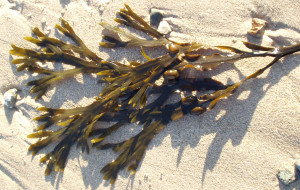Fucus vesiculosus , known by the common name bladder wrack or bladderwrack, is a seaweed found on the coasts of theNorth Sea, the western Baltic Sea, and the Atlantic and Pacific Oceans, also known by the common names black tang,rockweed, bladder fucus, sea oak, black tany, cut weed, dyers fucus, red fucus, and rock wrack. It was the original source of iodine, discovered in 1811, and was used extensively to treat goitre, a swelling of the thyroid gland related to iodine deficiency.
Contents
Uses
- Recently the researchers found that an extract of Fucus vesiculosus, which is a type of seaweed, promotes the contraction of fibroblast-populated collagen gels through increased expression of integrin molecules. In this study, they investigated the effects of topical application of an aqueous extract of this alga on the thickness and the mechanical properties of human skin. A gel formulation that included 1% of the extract was applied topically to human cheek skin twice daily for five weeks. A significant decrease in skin thickness measured by B-mode ultrasound was elicited, as was a significant improvement in elasticity measured with a Cutometer as compared with controls. In cheek skin, the thickness normally increases and the elasticity usually decreases with age. These results suggest that the Fucus vesiculosus extract possesses anti-aging activities and may be useful for a variety of cosmetics
Benefits
Fucus vesiculosus and other types of seaweed show anti-estrogenic effects, according to the Memorial Sloan-Kettering Cancer Center (MSKCC), which may account for the lower risk of estrogen-related cancers in Asian populations. Fucus vesiculosus also may improve some problems with menstruation. During a study published in the August 4, 2004 issue of BMC Complementary and Alternative Medicine, authors administered Fucus vesiculosus to three pre-menopausal women experiencing abnormal cycles or other menstrual-related problems. Fucus vesiculosus appeared to lengthen the menstrual cycle and had anti-estrogen effects. Excess estrogen is associated with premenstrual fluid retention, weight gain, mood swings, headaches and menstrual cramps.
Several types of seaweed, including Fucus vesiculosus, show potential for being able to prevent and treat cancer, based on animal and laboratory studies, according to the NIH. Fucus vesiculosus may suppress the growth of cancer cells.
Fucus vesiculosus extract may reduce blood glucose levels, making it useful for treating people with diabetes. This potential use is only based on animal research, however, according to the NIH, and reliable human studies are lacking.
Fucus vesiculosus contains fucans and fucoidans, components which show anticoagulant, or blood-thinning, properties in laboratory research, according to the NIH. Additionally, fucosterols in this substance reduce plasma cholesterol levels, as explained by the MSKCC. The plant may lower high blood pressure because it inhibits angiotensin-I-converting enzyme. Medications with this effect, called ACE inhibitors, are commonly used to treat high blood pressure.
A study published in the January/February 2002 issue of the Journal of Cosmetic Science determined that Fucus vesiculosus extract possesses anti-aging properties and should be useful as a cosmetic ingredient. The study found that a gel containing 1 percent Fucus vesiculosus extract applied to cheek skin twice daily for five weeks decreased skin thickness and improved elasticity when compared with control substances. The authors note that cheek skin thickness normally increases with age, whereas elasticity decreases.
Cautions
- Bladderwrack is POSSIBLY SAFE when applied to the skin. Bladderwrack is POSSIBLY UNSAFE when taken by mouth. It may contain high concentrations of iodine, which could cause or worsen some thyroid problems. Prolonged, high intake of dietary iodine is linked with goiter and increased risk of thyroid cancer. Treatment of thyroid problems should not be attempted without medical supervision.
Like other sea plants, bladderwrack can concentrate toxic heavy metals, such as arsenic, from the water in which it lives.
Interactions
-
- Medications for an overactive thyroid (Antithyroid drugs) interacts with BLADDERWRACK
Bladderwrack can contains significant amounts of iodine. Iodine can affect the thyroid. Taking iodine along with medications for an overactive thyroid might decrease the thyroid too much. Do not take bladderwrack if you are taking medications for an overactive thyroid.Some of these medications include methenamine mandelate (Methimazole), methimazole (Tapazole), potassium iodide (Thyro-Block), and others.
- Medications that slow blood clotting (Anticoagulant / Antiplatelet drugs) interacts with BLADDERWRACK
Bladderwrack might slow blood clotting. Taking bladderwrack along with medications that also slow clotting might increase the chances of bruising and bleeding.
Some medications that slow blood clotting include aspirin, clopidogrel (Plavix), diclofenac (Voltaren, Cataflam, others), ibuprofen (Advil, Motrin, others), naproxen (Anaprox, Naprosyn, others), dalteparin (Fragmin), enoxaparin (Lovenox), heparin, warfarin (Coumadin), and others.
- Medications for an overactive thyroid (Antithyroid drugs) interacts with BLADDERWRACK
Other names
Alga Noruega o Nudosa, Algue Laminaire, Ascophylle Noueuse, Ascophyllum nodosum, Atlantic Kelp, Black Tang, Bladder Fucus, Bladder Wrack, Blasentang, Chêne Marin, Cutweed, Fucus, Fucus Vésiculeux, Fucus vesiculosis, Goémon, Kelp, Kelpware, Kelp-Ware, Knotted Wrack, Laitue de Mer, Laitue Marine, Laminaire, Marine Oak, Meereiche, Norwegian Seaweed, Quercus Marina, Rockweed, Rockwrack, Schweintang, Sea Kelp, Seawrack, Tang, Varech, Varech Vésiculeux
References
Source: Wikipedia, https://en.wikipedia.org/wiki/Fucus_vesiculosus

